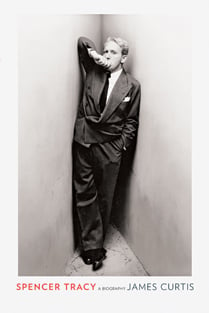 Spencer Tracy hated public life as much as a movie star possibly could. One of the world’s leading box-office attractions from the ’30s through his death in 1967, Tracy was moody, aloof, and uninterested in Hollywood glamour, even as he had affairs with glamorous actresses like Ingrid Bergman and Loretta Young. In this 1,000-page biography, Curtis tries to find the person underneath the Tracy enigma, with the help of previously unexamined material, including Tracy’s own short and sardonic diary entries. (After a scene with his frequent screen partner and lover Katharine Hepburn, he wrote: “Bad pic. K. bad. Me bad.”) With access to medical records, Curtis traces the ups and downs of Tracy’s famous alcoholism: sometimes it was under control, while other times the studio publicists had to keep the media from reporting, for instance, that he “ran amok in New York for the better part of a week.”
Spencer Tracy hated public life as much as a movie star possibly could. One of the world’s leading box-office attractions from the ’30s through his death in 1967, Tracy was moody, aloof, and uninterested in Hollywood glamour, even as he had affairs with glamorous actresses like Ingrid Bergman and Loretta Young. In this 1,000-page biography, Curtis tries to find the person underneath the Tracy enigma, with the help of previously unexamined material, including Tracy’s own short and sardonic diary entries. (After a scene with his frequent screen partner and lover Katharine Hepburn, he wrote: “Bad pic. K. bad. Me bad.”) With access to medical records, Curtis traces the ups and downs of Tracy’s famous alcoholism: sometimes it was under control, while other times the studio publicists had to keep the media from reporting, for instance, that he “ran amok in New York for the better part of a week.”
Writing with the co-operation of Tracy’s daughter Susie, Curtis gives a nuanced portrait of Tracy’s unhappy but lifelong commitment to his wife, Louise, and his guilt about the deafness of their son John: as a Catholic, he felt “the raw burden of sin” over John’s disability, and it drove a lot of his inner torment. There’s even new information about the much-discussed relationship of Tracy and Hepburn: Curtis discusses the extent to which Hepburn shaped Tracy’s career from the moment they met, steering him into choices both bad (his ill-fated return to the Broadway stage) and good (reuniting him with the director who first discovered him, John Ford).
The book’s profusion of detail can be wearing. Curtis, author of a W.C. Fields biography, can’t leave anything out about the making of any movie. Still, this information gives an idea of the day-to-day life of a star, and suggests why Tracy—despite being revered by his peers as America’s greatest actor—wasn’t in more truly great movies: as a reporter observed when watching Tracy on the set of Northwest Passage, “he worries and frets and deprecates his own talent.”